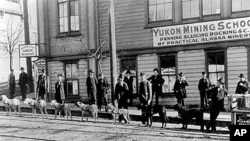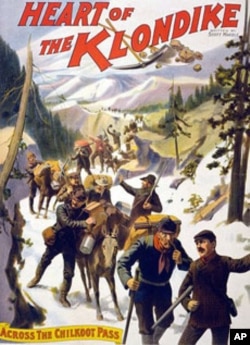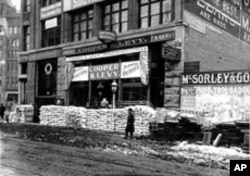Lots of Americans have heard of the Klondike because of a popular ice-cream bar named after the place.
It's in Canada, so we could call this essay Only in Canada. But the Klondike is right next to Alaska, and its moment in the sun is mostly an American story.
It begins 113 years ago in what was then a dusty little river town of Seattle in the relatively new state of Washington. In the dead of night — three o'clock in the morning — one July day, a steamship docked after a trip from Alaska. Later that day, the Seattle newspaper printed a one-sentence item on the arrival that changed the course of history in the American Northwest.
The newspaper reported that the steamship carried, in addition to 68 passengers, more than a ton of gold. It turned out to be more than TWO tons, carried in suitcases, boxes, and gunny sacks.
The 68 passengers were miners returning from the Klondike River in Canada's Yukon Territory. They had found nuggets of gold as big as walnuts in a Klondike riverbed.
Once the people in Seattle read that story, every seat aboard the steamship's RETURN trip was booked within minutes. A great Klondike Gold Rush was on.
Over the next few years, more than 100,000 people would leave Seattle to seek their fortunes in the Klondike gold fields.
They loaded up on provisions, because the Royal Canadian Mounted Police, who met them at the border, declared that no one could enter the Yukon without at least one YEAR's worth of food, tools, and blankets. That meant everyone setting off to strike it rich was loaded down with at least a ton of supplies.
Of the 100,000 who left Seattle, only 40,000 reached the gold fields. Some of them, and thousands of pack animals, died in the rugged mountain passes. Only about 4,000 miners found gold, 400 panned enough to be considered wealthy, and only 50 — 50 out of 100,000 — managed to keep their wealth and remain rich the rest of their lives.
The story is told at the Klondike Gold Rush National Historical Park in the heart of Seattle, and another branch of the museum up in Skagway — 1,800 kilometers away in Alaska. The Klondike area itself in Yukon Territory is almost deserted.






